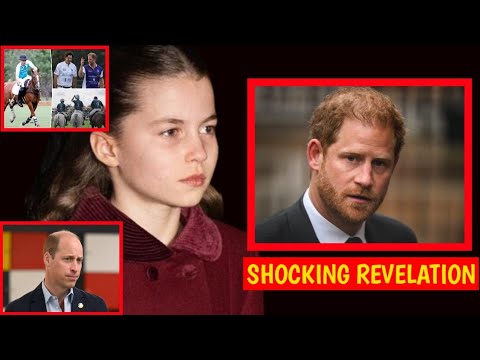Princess Charlotte recently made headlines with a rare and heartfelt statement that has stunned both the public and royal insiders. Her words came amid renewed tension between her father, Prince William, and her uncle, Prince Harry, following the release of a controversial Netflix documentary. This unexpected moment has reignited public interest in the ongoing rift between the royal brothers, and it appears to have brought a fresh and innocent voice into a complex and emotionally charged situation.
The new documentary, simply titled Polo, was released by Netflix on December 10 and quickly drew attention not only for its intimate portrayal of Prince Harry’s connection to the sport but for a notable absence—Prince William. As a long-time polo player who has championed the sport and used it as a platform for charitable causes, William’s omission from a documentary focused on royal involvement in polo left many puzzled. The series, produced by Harry and Meghan Markle, highlights Harry’s personal journey and commitment to the sport but makes no mention of his older brother’s contributions, sparking widespread speculation and criticism.
For royal watchers and insiders, the exclusion was not just an artistic choice—it appeared to be a deliberate move. Many saw it as a further sign of the deepening estrangement between the two princes. Polo has long been a shared tradition for the royal family, handed down from their father, King Charles III. William and Harry were once a united front, often seen competing together in charity matches. To sideline William from a documentary that celebrates this very sport seems to some like a calculated snub, underscoring the emotional and personal distance that has grown between the siblings.
What surprised the world even more was the intervention of nine-year-old Princess Charlotte. During a private engagement, she reportedly expressed sadness and confusion over the strained relationship between her father and uncle. Sources close to the family described her words as surprisingly mature and emotionally resonant. In her simple yet impactful way, Charlotte is said to have asked, “Why can’t they just play polo together like they used to?” Her innocent plea for unity struck a chord with the public and was seen as a powerful commentary on the ongoing drama.
Charlotte’s statement, though brief, added a new layer to the public narrative. It reminded everyone that beyond the headlines, this is a family grappling with real emotional wounds. Her call for reconciliation wasn’t just a child’s wish—it was a pointed reflection on how deeply the rift has affected those around them. Her voice, unburdened by royal protocol or adult pride, delivered a message that felt more authentic and disarming than any official statement.
Critics of the documentary noted that it seemed less about polo and more about bolstering Harry and Meghan’s personal brand. By centering Harry and ignoring William’s influence on the sport, the film paints a picture of independence that many see as contrary to the royal family’s longstanding values of unity and public service. Royal commentator Richard Fitzwilliams was blunt in his reaction, stating that leaving William out of the documentary felt like a betrayal, not just of the sport’s history but of their shared past. He and others argue that it was a missed opportunity to highlight common ground and possibly ease public tension between the brothers.
Whether the exclusion was intentional or simply a creative decision made for storytelling purposes, its impact has been significant. The emotional fallout has been intensified by Charlotte’s heartfelt comment, which now reverberates through royal circles and public opinion alike. Her intervention may not have been planned or political, but its sincerity has given it power.
This moment has also sparked broader reflections about what the future holds for the royal family. If William and Harry are unable to mend their relationship, what does that mean for their children and the monarchy’s next generation? Charlotte’s small but poignant voice has drawn attention to the importance of healing not just for appearances, but for the family’s emotional well-being and legacy. Her question, though childlike, carries weight: can a family so publicly torn apart ever truly reconcile?
While most of us are not royal, their struggles with communication, pride, and forgiveness are universally relatable. There are lessons to be learned. First, open communication is essential. When people stop talking, misunderstandings grow and resentment festers. Second, perspective can be powerful. Sometimes it takes an innocent question or a new voice—like Charlotte’s—to bring clarity. Third, reconciliation is possible, but it requires effort and humility. Extending a hand, even when it’s difficult, can be the first step toward healing.
In the end, Princess Charlotte’s candid words may be remembered as a defining moment not only in the royal family’s ongoing story but in her own emergence as a figure of compassion and clarity. At just nine years old, she has reminded the world of something deeply human—that families, no matter how privileged or powerful, are not immune to pain, but they also have the potential to forgive and grow. Her voice may be small for now, but it echoes loudly in the hearts of many who hope for a more united future for the House of Windsor.
So what are your thoughts on this unexpected turn of events? Can the royal family find common ground again, or are the divisions simply too wide to bridge? Share your perspective as this royal story continues to unfold.
